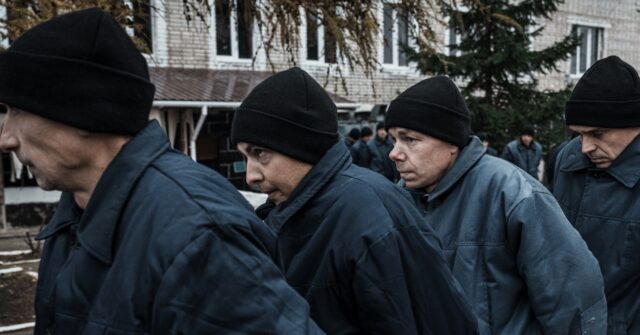

The Russian and Ukrainian armed forces have been accused of torturing and executing prisoners of war over the past year by the United Nations, which said that such actions could amount to war crimes.
A report from the Office of the United Nations High Commissioner for Human Rights (OHCHR) claimed that both Russia and Ukraine have engaged in the summary execution of prisoners of war, which contravenes numerous international human rights laws and treaties on war.
The OHCHR said that they documented cases of summary executions of at least 25 Russian prisoners of war (POWs) under the authority of Ukrainian forces.
“Such cases amount to gross violations of [international human rights law] and serious violations of [international humanitarian law] that may constitute war crimes,” the report said.
The UN body went on to claim to have documented poor treatment of POWs at eight of the 31 transit or permanent camps run by the Ukrainian government, in which they found documented cases of torture and other forms of poor treatment of Russian prisoners, including so-called “welcome beatings” in a prison in Dnipro from March to May 2022.
That’ll Help! International Criminal Court Issues Arrest Warrant for Vladimir Putinhttps://t.co/c0hp4CIqRU
— Breitbart London (@BreitbartLondon) March 17, 2023
According to the OHCHR, the Ukrainian government provided them with “full and confidential access” to the locations where prisoners of war are being held, as opposed to the Russian government, which refused to do the same.
Through investigative efforts, including interviewing Ukrainian POWs who were released from Russian captivity, the UN said that they found evidence of the summary executions of 15 POWs at the hands of the Russian armed forces or the Wagner Group mercenary organisation or other contracting groups.
They went on to claim evidence of POWs being used as human shields, the death of two wounded prisoners for lack of medical attention, and the use of torture to extract information.
The report also highlighted an instance that went viral on social media in July of last year in which a Russian soldier was filmed appearing to cut off the testicles of a man wearing a Ukrainian armed forces uniform before shooting him in the head.
The UN said that while they were not able to identify the victim in the video, the “incident does not appear staged and would manifestly amount to torture, including sexual violence, and wilful killing.”
A series of videos published in November appearing to show the summary executions of dozens of Russian POWs at the hands of Ukrainian forces were also deemed as “highly likely authentic.”
Russia and Ukraine Blame Each Other After Dozens of Azov POWs Killed in Prison Explosion https://t.co/cjYvgERFwK
— Breitbart London (@BreitbartLondon) July 31, 2022
The report claimed that while torture and other poor treatment of prisoners of war occurred on both sides, the practice was more commonly documented against Ukrainian POWs, with nine out of ten of those interviewed reporting such abuse compared to around half of Russian prisoners who claimed to have been tortured or subject to other abuse.
Commenting on the findings, Matilda Bogner, the head of the UN monitoring mission, said: “We are deeply concerned about the summary execution of up to 25 Russian prisoners of war and persons ordered to combat by Ukrainian armed forces, which we have documented.”
“In relation to the treatment of Ukrainian prisoners of war, we are also deeply concerned by the summary execution of 15 Ukrainian prisoners of war shortly after being captured by Russian armed forces,” Bogner continued. “The Wagner Group — military and security contractors — perpetrated 11 of these executions.”
While often lauded by the West, Ukrainians have previously been accused of wrongdoing in the war by Amnesty International, who alleged that they were unnecessarily endangering the lives of civilians by establishing military bases in residential areas including schools and hospitals, as well as launching attacks from heavily populated civilian areas in attempts to deter retaliation from the Russians.
President Volodymyr Zelensky slammed the report from the human rights organisation, claiming that Amnesty International was “playing into Russia’s hands” and shifting “blame from the aggressor to the victim of aggression.”
Embarrassingly, just days later Amnesty International backed down and apologised, issuing a statement in which the organisation said that it “deeply regrets the distress and anger that our press release on the Ukrainian military’s fighting tactics has caused.”
WATCH: Ukrainian Forces Release Video of ‘Street Fight’ with Wagner Mercs in Bakhmut https://t.co/hhaADD7J2X
— Breitbart London (@BreitbartLondon) March 24, 2023
Follow Kurt Zindulka on Twitter here @KurtZindulka





